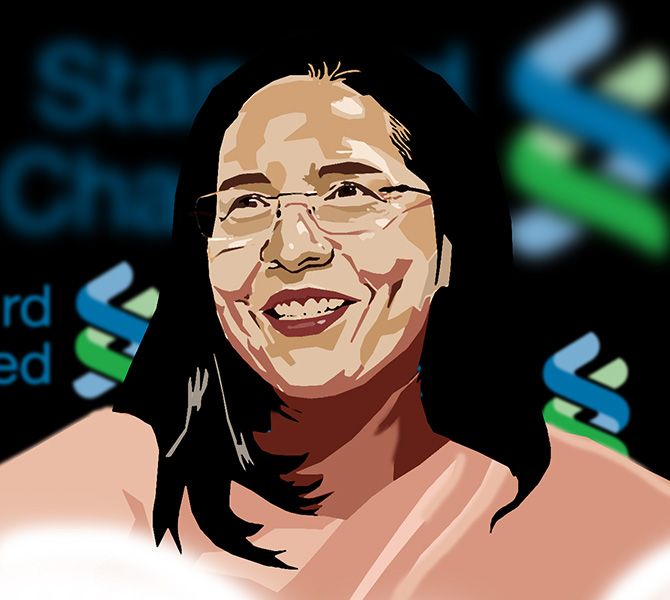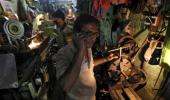StanChart India CEO Zarin Daruwala is building a culture of 'celebrating liabilities,' the tough negotiator tells Niraj Bhatt and Anup Roy over lunch.
Illustration: Dominic XavierRediff.com

Zarin Daruwala, who took over as Standard Chartered Bank’s India head in April 2016, has had an eventful nine months.
The first thing she did after taking charge was to work with a consulting firm on the bank's future strategy.
The strategy includes firing up the retail engine, starting off technology investments and improving productivity and customer service.
She has also been busy leveraging her network in the corporate world and convincing promoters to sell assets to address the bank's stressed loan problem.
Like all other bankers, she too got busy with demonetisation since November.
As she is pressed for time, we agree to her request of having lunch at her office in Bandra Kurla Complex.
Standard Chartered Bank, which has presence in 70 countries, has changed since new Chief Executive Bill Winters took over in mid-2015.
Winters did away with verticals reporting to global heads, and gave more operational responsibility to the country CEO.
We settle down in Godavari, one of the bank's conference rooms, and start on the Caesar salad.
We ask her how difficult the switch was from her first job at ICICI Bank -- where she worked for 26 years -- to Standard Chartered. "It was smooth as I wasn't changing my industry; I only moved from one bank to another," says Daruwala.
At a time when other foreign banks in India are scaling down on retail, StanChart's plan has put retail as the critical piece, with a large proportion of the 800 new hires in that segment.
Daruwala explains the reason: "It's very different for other banks and us. India is among the top four markets for StanChart, and it is meaningful in the bank's scheme of things globally.
While other foreign banks have current and savings accounts (CASA) of over 50 per cent, for StanChart it is only 35 per cent.
Daruwala is trying to push this figure up, but says that it is a long journey.
"Low CASA results in higher cost of funds, and that leads to adverse selection of loans," she says.
The organisation was asset-centric, and she is trying to change it to liabilities first and building a culture of "celebrating liabilities."
The bank has set its plan in motion to improve retail, with concrete targets every six months.
"The brand, after all, is strong in India. All it needs is tapping the retail market aggressively," she says.
Her mobile phone rings, she excuses herself and says it's her son calling from the US.
A first year engineering student, he is leaving for India for the first time, the same day, and needs to consult her about the immigration formalities.
Daruwala breaks into Gujarati, and mildly scolds him for staying up till 3 am.
Technology, which was earlier centralised globally, now has a country and a sector element.
Besides, the unified payment interface, IMPS, and Bharat Bill Payment System are all India-specific elements within technology.
She bumped up the tech budget for India, and made it either the first or the second country in StanChart's global map of 70 countries to pilot new products and services.
Besides process change, she is also counting on end-to-end digital solutions to improve productivity.
How was her experience managing demonetisation?
In many ways, it would be a demonstration of her leadership.
While she had managed the wholesale bank at ICICI Bank, which in itself is huge, she hadn't had much experience of retail banking.
As part of the senior leadership at ICICI Bank, she was present in all the strategy meetings and had macro understanding of retail.
She says that one can't have hands-on experience in everything, and adds that she has a good team at the micro level.
For demonetisation, she wore her crisis management hat.
"We asked the Reserve Bank of India if we could release soiled Rs 100 notes from our our currency chest; customers were happy to take them."
StanChart separated queues for senior citizens, and provided for refreshments.
She ordered all those at headquarters with experience of handling cash to go to the branches.
"While the queues were long, it was well-organised," she says, stressing that for every five complaints from customers, she received 30 compliments.
Daruwala is soft-spoken and unassuming, but her competitors and borrowers say she is an excellent negotiator and has been successful in extracting repayment from many a recalcitrant borrower.
The main course of fish and chips, Thai green curry, rice and lasagna is neatly arranged in the corner of the room.
Over lunch, we ask what makes her such a good negotiator.
"Nobody teaches you; you observe people and learn. Chanda Kochhar is fantastic at negotiation," she fondly says of her boss of a dozen years.
Notwithstanding corporate boundaries, they are still close, says Daruwala.
She says one has to treat defaulters with dignity.
"Most Indian promoters don't want to default. They are willing to work with bankers and more often than not ready to sell assets and repay banks," she said.
However, the same set may turn hostile when bankers treat the promoters shabbily, because they have defaulted on payment.
Of course, there are unscrupulous customers out there to trip the system.
"They are a different breed altogether and dealing with them is always difficult. But you figure out ways, provided you are persistent enough," she says.
Her skills in dealing with promoters come in handy at the bank.
In a few cases, she managed to convince promoters to sell assets in the first meeting.
With large corporate accounts, she personally reaches out to clients, both for getting new business and for recovering dues.
"It makes a huge difference if the CEO is involved. It's symbolic too, and shows the seriousness of the bank, she says.
Daruwala is good at structuring financial deals and finding innovative solutions.
"I have a never-say-die attitude,” she says and talks about a particular deal where one of her borrowers had put an industrial unit in the US on the block.
She found an interested buyer, but he backed out, as his brother was in the same business. She met him again and convinced him to buy the asset.
A rank holder in chartered accountancy and a gold medallist from ICSI, Daruwala joined ICICI Bank as a management trainee.
Her parents wanted her to stay in Mumbai, and Y H Malegam, the well-known chartered accountant, recommended she join ICICI Bank, where she rose through the ranks and in 2010 went on to head the wholesale bank, which accounts for a significant proportion of ICICI's assets and profits.
We are done with the main course and start on the blueberry cheesecake. We ask how she has managed her family commitments.
She says that one finds solutions around situations. Her children's birthdays were celebrated on weekends, and she changed her office timings when they had exams.
A rule she follows is not to carry work home or work on weekends.
"Once you have accepted that your "me time' is going to be low, it's fine," she says.
Please check out more interesting features in the Related Links Below!












 © 2025
© 2025